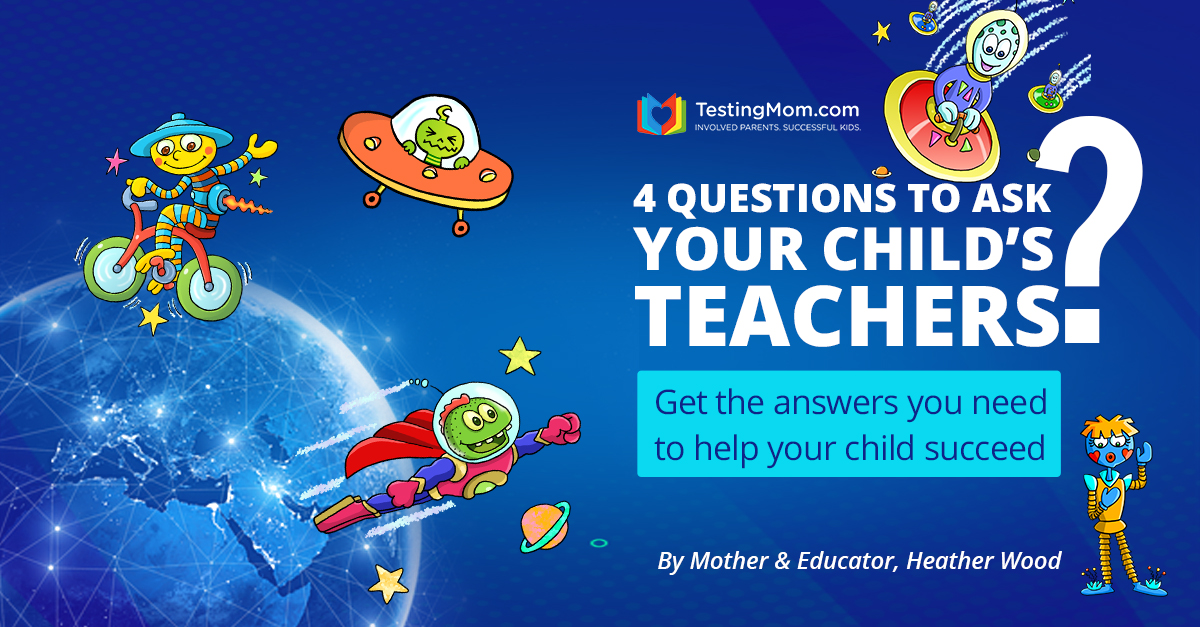› 4 Questions to Ask Your Child’s Teachers: Get the answers you need to help your child succeed
4 Questions to Ask Your Child’s Teachers: Get the answers you need to help your child succeed
posted by Karen Quinn, The Testing Mom - October 19th, 2021

Welcome to October, that time of year when children have finally settled into their new back-to-school routines, and parents are eagerly anticipating a flurry of school activities like meet-the-teacher night and parent-teacher conferences. I have a unique perspective as a parent of school-aged children. Not only am I a mother, but I am also an educator. Because of this, I have “behind the scenes” knowledge that most parents lack. Take a moment to check out four questions you to ask teachers that in my experience can make the biggest impact on his academic success.
Questions to ask Teachers:
1. What assignments are included in my child’s current grade?
Sometimes it’s not enough to know that your child needs to “work harder” to get better grades. It is more helpful to know what specific assignments are giving your child the most trouble. Then you can provide targeted support for the sort of help your child needs.
For example, maybe your child’s lower-than-expected grade is due to a failure to turn in skill practice worksheets, which are a considerable portion of your child’s average. If you know this, then you can help your child be more organized with a spiffy new set of labeled folders and conduct nightly backpack checks to make sure everything is neatly in its place.
Also, knowing the assignment types that contribute most to your child’s grade can help you give him academic support where she needs it most. Are most of your child’s grades focused on quiz grades? Then you know that you need to support your child most when she is studying for quizzes and tests.
2. How is my child performing compared to the other students in his class?
Teachers may or may not have class averages available to share with you. But even if they don’t, they can at least give you their impression of your child’s performance compared to his peers. This can begin a conversation about proper placement for your child. For instance, perhaps the work is not challenging enough, and he needs to be placed in a more advanced course, or simply needs some extra enrichment. Or perhaps he is struggling more than others and needs some additional tutoring. Knowing where your child falls among her classmates can help you determine the best next steps for your child’s education.
3. How often do you give homework and where can I find a list of assignments?
In this blogger’s opinion, the largest determining factor in a student’s success is parent involvement and how education is valued in the home. When students grow up around parents who place importance on learning and doing good work, then students have a better chance of success. Being involved and knowing what homework your child is responsible for each night is important. Not only does it help your child do his best academically, but it sends a message to him that education is important and something to take seriously.
4. Are there any nonacademic factors contributing negatively to my child’s learning?
Perhaps your child is distracted by some sort of conflict between classmates. Even what may seem to be small problems can become bigger in your child’s mind and distract her from her studies. Your child’s teacher may also be able to give you some insight into any learning barriers your child may be experiencing in the classroom. The teacher certainly cannot (and should not) be desk-side diagnosing your child. However, she could give you some clues to potential health or behavior issues you may not have noticed at home.
For example, maybe the teacher has observed that your child has difficulty staying on task or is having trouble seeing the whiteboard from her desk. If you know this, then you can follow up with the school’s child study team or your pediatrician for some help and advice.
These are just a few questions to ask teachers. The overall theme here is communication. The teacher is your partner in helping your child succeed academically, and they are more than happy to help!
Joyfully,
Heather Wood
TestingMom.com Tutor




Tell us about your experiences